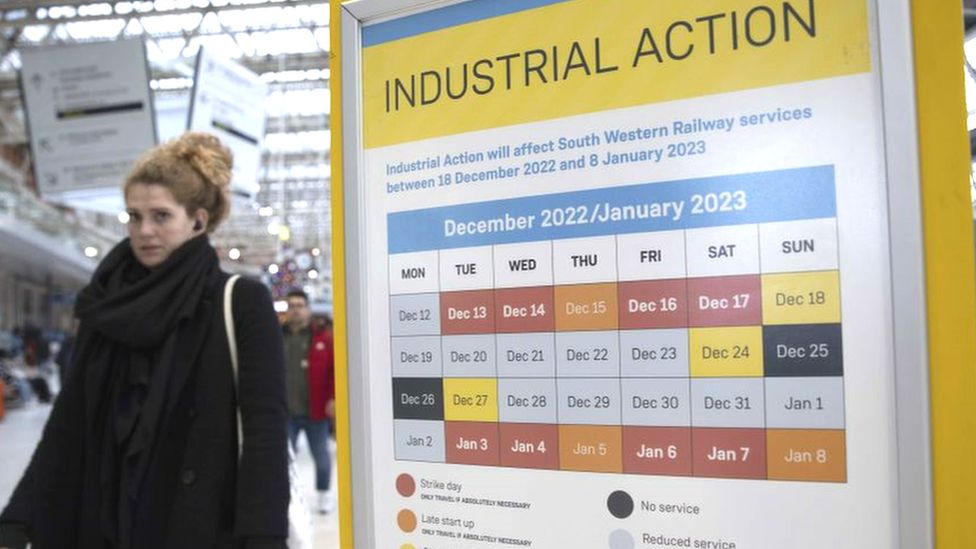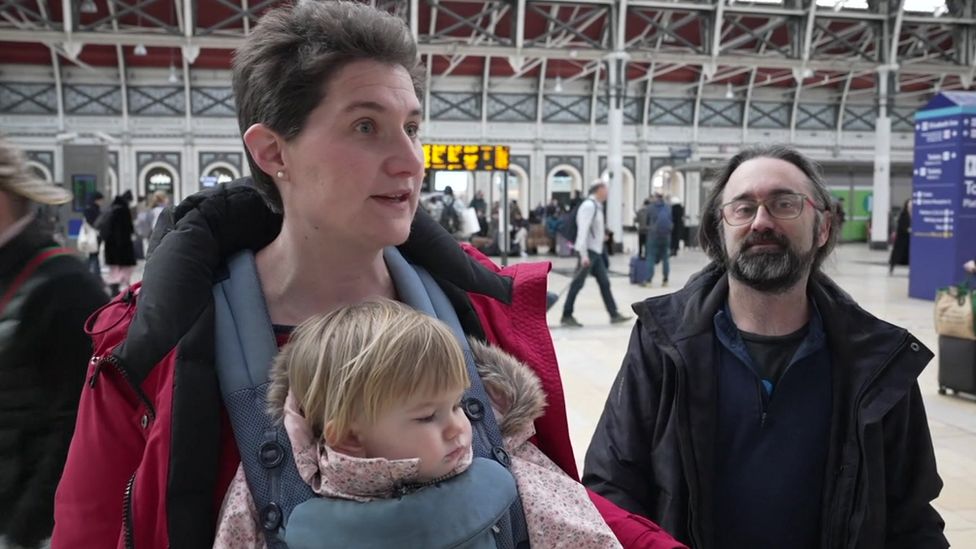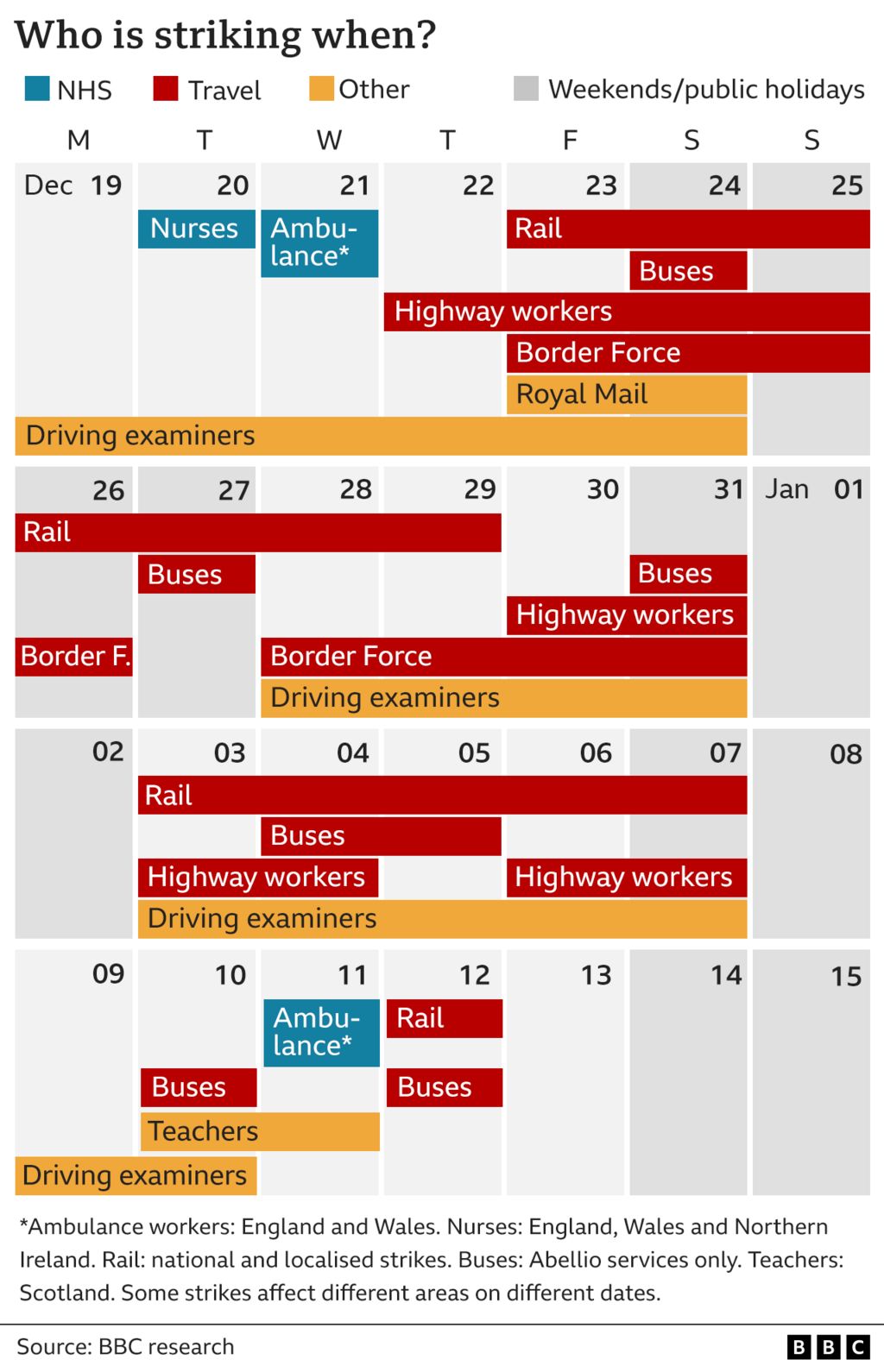
Rail passengers are being warned to avoid travelling on Saturday unless "absolutely necessary" as further walkouts are set to cause disruption.
Network Rail said the Christmas Eve strike by its workers in a row over pay would have a severe impact on services.
Trains will finish at around 15:00 before RMT union members begin industrial action at 18:00.
In the latest strikes in the run-up to Christmas, postal workers and Border Force staff are also walking out.
Around 1,000 Border Force workers began strike action on Friday at Heathrow, Gatwick , Manchester, Birmingham, Cardiff and Glasgow airports, as well as the Port of Newhaven.
Border disruption has been minimal, with military personnel and civil servants being drafted in to cover strikers.
Heathrow Airport said operations were running smoothly on Saturday. A spokesperson added: "The immigration halls are free flowing with Border Force and the military contingency providing a good level of service for arriving passengers."
Border Force personnel will be striking until the end of the year - with the exception of 27 December - but there are warnings strikes could last for months unless a new pay deal is negotiated.
Meanwhile industrial action at Network Rail, which maintains the UK's rail system, will continue until 06:00 on 27 December.
Network Rail said there would be "significantly reduced services across the rail network on Christmas Eve".
Last trains on long-distance routes will depart much earlier, with some rail companies unable to run any services at all.
The last train times on major routes include the 09:45 from Leeds to London, the 11:22 from London to Edinburgh, and the 12:48 from London to Manchester.
"Only travel if absolutely necessary on Saturday 24 December," said Network Rail.
Families at London's Paddington Station told BBC News they felt anxious over whether trains out of the station would depart as planned or whether they would be cancelled at the last minute.
Leela, Richard and their baby Kalinda said they were on their way to Bristol to spend their first Christmas with family since the pandemic.
"We were quite lucky we've booked for the morning anyway so I think hopefully we're going to get through without having to change our plans," Leela said.
She added: "But we were really anxious when we heard about the strikes so we've been checking all week that the trains were not going to be cancelled and we would be able to get there."
Meanwhile a couple of miles away at Euston Station, Kartik Aggarwal's train has been cancelled. The 24-year-old student said he faced missing a Christmas party in Birmingham.
"It's been really bad," he said. "We were planning for a long time only to have two trains get cancelled with no notification.
"We came running but still nothing. I feel very irritated, like we're wasting our time."

Jack Couzens, head of roads policy at the AA, said traffic on the roads was moving fairly well so far on Saturday but added that rail strikes had led to more people "jumping into their cars".
"There have been pockets of congestion on the A13, the M25, the M5... but as things stand traffic is moving okay," he said at lunchtime.
"Yesterday was a particularly busy day on the roads - indeed our own breakdown service did around 13,500 jobs [which is] well above our usual averages.
"It shows more people are jumping into their cars and just don't want to take the risk of what's going on with the railway service."
The motoring group said a recent survey showed just under a third of UK adults said they would be driving to see family and friends ahead of Christmas when they would usually use the train.

Watch Make Sense of Strikes on iPlayer and find out more about why people are striking and whether industrial action works.

The railway strikes come at a time of widespread industry walkouts, as staff across a range of sectors are involved in disputes over pay, jobs and working conditions.
Workers are seeking wage rises as the cost of living soars. The rate at which prices are rising, known as inflation, is running at nearly 11%, which remains close to a 40-year high.
Other industrial action on Saturday includes:
- More than 115,000 Royal Mail workers from the Communication Workers Union are walking out on one of the busiest days for pre-Christmas deliveries. Letters won't be delivered, although some parcels are still being dispatched.
- Some National Highways traffic officers are on strike in London and south-east England. National Highways says no roads will be closed and it has "well-rehearsed resilience plans in place".
- Bus drivers for Abellio in London are walking out. The routes affected are mostly in south and west London.
Elsewhere, ambulance drivers, nurses and driving examiners are all set to strike at various points over the festive period and into the new year.
The prime minister said he was "sad" about disruption caused by strikes, but insisted he had acted "fairly and reasonably" over public sector pay.
"I want to make sure we reduce inflation, part of that is being responsible when it comes to setting public sector pay. In the long term it's the right thing for the whole country that we beat inflation," Rishi Sunak said.

Previous strikes by the RMT have had a major impact on services throughout England, Scotland and Wales. The union is due to hold further walkouts on 3-4 January and 6-7 January.
Union members have rejected offers in a dispute over pay, job security and working conditions.
Network Rail said the deal it has put forward is "fair and affordable".
"That's why we urge the RMT to really think again about looking at what's on the table. And we'll look to see what we can do and sit around the table after the strikes finish in the new year," Kevin Groves, Network Rail's chief spokesman, told the BBC.
RMT general secretary Mick Lynch said: "The union remains available for talks to resolve this dispute.
"But until the government gives the rail industry a mandate to come to a negotiated settlement on job security, pay and conditions of work, our industrial campaign will continue into the new year, if necessary."
In a statement, the RMT added that it believed the government had "blocked" rail employers from making a deal with the union.
But a Department for Transport spokesperson said: "Far from blocking a deal, the transport secretary and rail minister have facilitated talks and ensured a fair and reasonable offer was put forward, which the RMT rejected despite a significant number of members voting to accept."

How are you affected by the Christmas Eve rail strikes? Share your experiences by emailing haveyoursay@bbc.co.uk.
Please include a contact number if you are willing to speak to a BBC journalist. You can also get in touch in the following ways:
- WhatsApp: +44 7756 165803
- Tweet: @BBC_HaveYourSay
- Upload pictures or video
- Please read our terms & conditions and privacy policy
If you are reading this page and can't see the form you will need to visit the mobile version of the BBC website to submit your question or comment or you can email us at HaveYourSay@bbc.co.uk. Please include your name, age and location with any submission.
https://news.google.com/__i/rss/rd/articles/CBMiLGh0dHBzOi8vd3d3LmJiYy5jby51ay9uZXdzL2J1c2luZXNzLTY0MDc1NjQz0gEwaHR0cHM6Ly93d3cuYmJjLmNvLnVrL25ld3MvYnVzaW5lc3MtNjQwNzU2NDMuYW1w?oc=5
2022-12-24 13:48:09Z
1709644959
Tidak ada komentar:
Posting Komentar